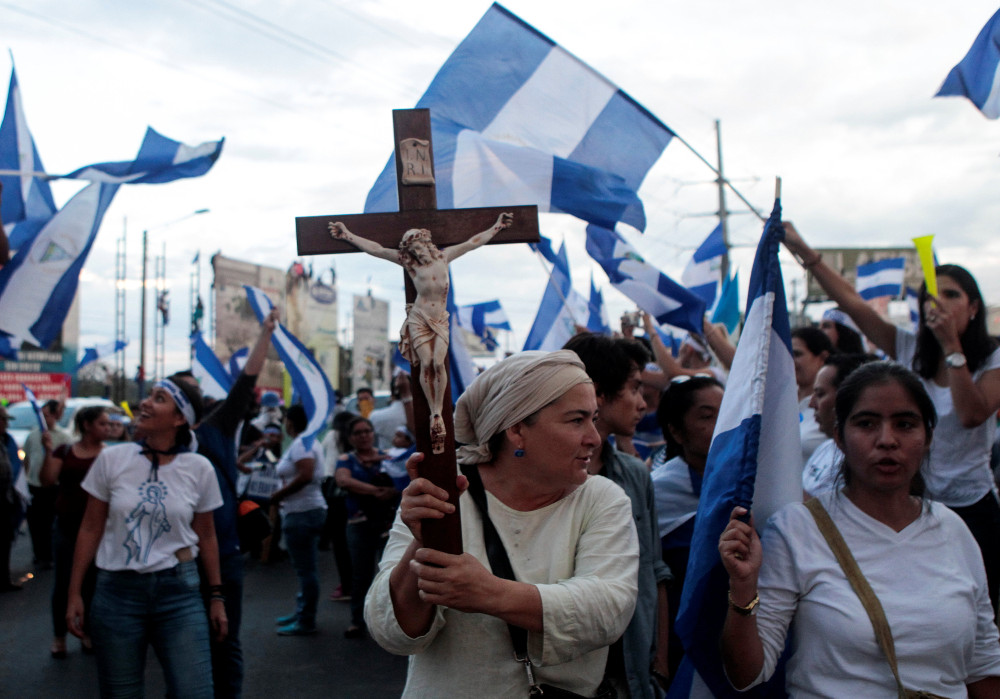
A protester holds a crucifix during a protest against the government of Nicaraguan President Daniel Ortega in Managua, Nicaragua, on May 15. (CNS photo/Oswaldo Rivas, Reuters)
"Hope amid turmoil." The theme of Global Sisters Report's overarching series for 2023 is also an apt description of the stories we published this past year.
Here are 10 noteworthy stories that we hope you will take time to read again, or share with others if you've already read them. In return, we will continue to be a source of inspiration, peace and hope by telling the stories of women religious worldwide.
Hope Amid Turmoil: Sisters in Conflict Areas
Our flagship series for 2023 offered a look at the lives and ministries of women religious serving in dangerous places all over the world. We published columns and articles from Ukraine, Nigeria, Nicaragua, Colombia, Croatia, Kenya, Sri Lanka and more.
Despite these stories of anguish and suffering, our goal for this series was to provide hope, to show our readers that despite conflict and strife, corruption and violence, women religious face challenges head on and overcome tremendous odds to continue their ministries.
On May 1, we were thrilled to launch GSR en español, a Spanish-language edition of our website with an emphasis on Catholic sisters in Latin America and Spain in selected articles and columns either written originally in Spanish or professionally translated.
With a bilingual team of translators, editors, correspondents and freelancers, GSR en español caters to the interests of our Spanish-speaking audience in Latin America and Spain while also manually translating articles featuring sisters all over the world. (This is all in addition to our new "Translate" button at the top of our website that uses Google Translate to show anything on the site in one of more than a dozen languages.)
If you are interested in keeping up with the original Spanish language content at our site, be sure to sign up for the weekly GSR en español newsletter.
Advertisement
The first session of the Synod of Bishops at the Vatican concluded Oct. 28 with a 41-page "synthesis" report on the discussions. The second session will be held in Rome in October 2024 and will create a final report of proposals for Pope Francis to consider. The National Catholic Reporter's feature series includes reporting by Global Sisters Report Latin America regional correspondent Rhina Guidos, who attended the first half of the monthlong synod.
This first report, titled "A synodal church in mission," followed an intense month of debates among some 450 participants over a range of big issues, including the role of women in church ministries, clergy sexual abuse and better inclusion of LGBTQ Catholics. For the first time since the establishment of the church's Synod of Bishops in 1965, about 50 women were granted voting rights by the pope at the assembly.
"I won't use the term success, but it has been fruitful. It's a new state in the experience of synodality — there was a lot of grace, it was a time of joy," said Xavière Missionary Sr. Nathalie Becquart, an undersecretary of the Vatican's Synod of Bishops office, which made her not only a voting participant but a member of the synod itself. "It brought us more communion. There was mutual listening and understanding from different people with different backgrounds and perspectives. So in a sense it was a true synodal experience."
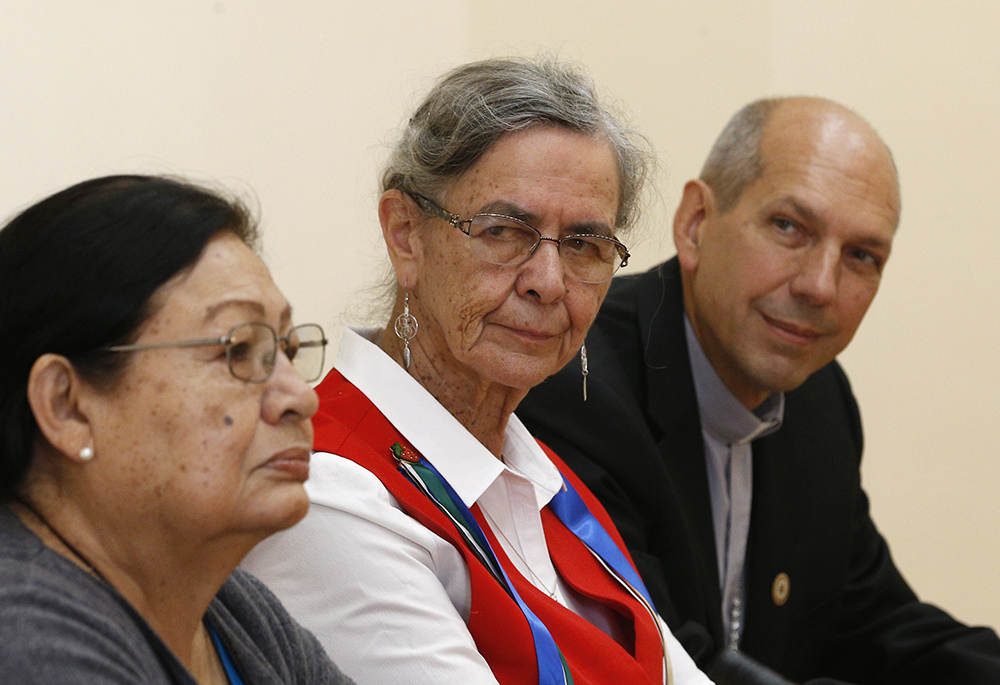
Rita Means, tribal council representative with the Rosebud Sioux Tribe, Sr. Priscilla Solomon, a member of the Ojibway people and of the Sisters of St. Joseph of Sault Ste. Marie, and Archbishop Donald Bolen of Regina, Saskatchewan, attend a news conference with Indigenous leaders from North America Oct. 17, 2019, in Rome. (CNS/Paul Haring)
In a three-part series, journalist Sandrine Rostello, took months of research and more than a dozen interviews to look into reconciliation efforts for Indigenous schools taking place within religious communities in Canada.
It is uncomfortable, taboo almost, to talk about the pain sisters may feel around residential schools, especially when their congregations contributed to the suffering of thousands of children it had vowed to take care of. In committing to reconciliation, sisters have had to come to terms with that overshadowing legacy.
"We were part of something that was damaging. Were we knowingly part of it? As far as we can figure out, we were not. Did we intend that? No, of course, we didn't intend it," said Sr. Marie Zarowny, president and board chair of the Sisters of St. Ann, which helped run four residential schools. "I'm not denying that it has been a struggle, and it continues to be a struggle for some sisters."
The series continued with a deeper look at the steps being taken toward reconciliation as recommended by the Truth and Reconciliation Commission and a closer look at Returning to Spirit, an Indigenous-led, not-for-profit group that was co-founded by the Sisters of St. Ann.
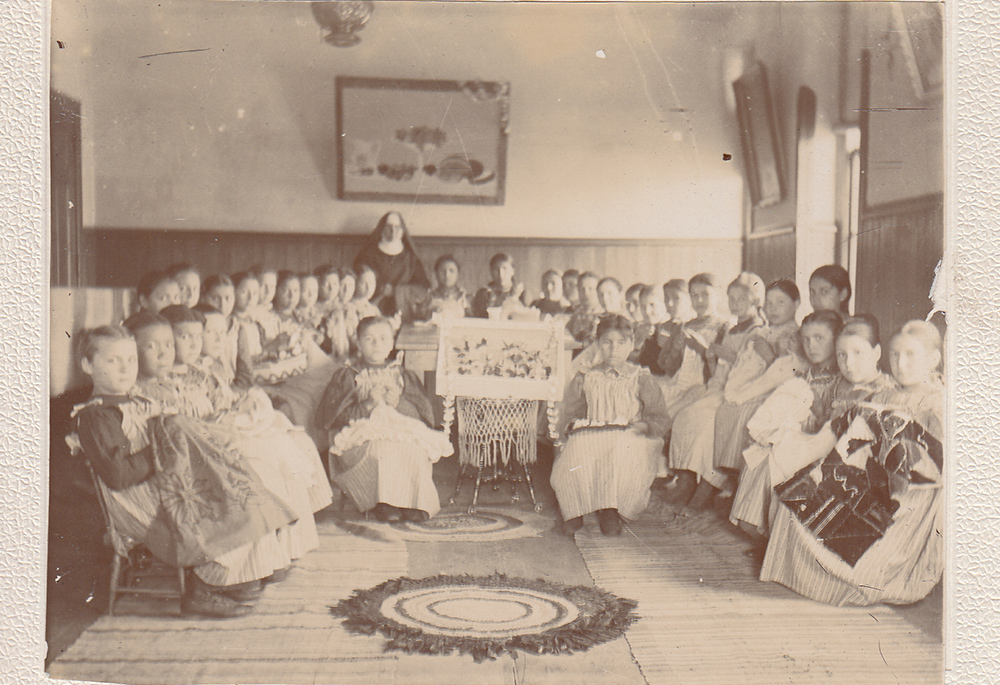
Female students show their handiwork at St. Benedict's Mission School on the White Earth Indian Reservation in Minnesota in the 1890s. ("Work room at St. Benedict's Mission School," College of Saint Benedict/Saint John's University Libraries, https://csbsjulib.omeka.net/items/show/928)
Newly published list shows Catholic sisters ran 74 US Native American boarding schools
A group of archivists, historians, concerned Catholics and tribal members published in May the first comprehensive list of Native American boarding schools in the United States run by Catholic entities, reported GSR national correspondent Dan Stockman.
The Catholic Truth & Healing website lists 87 Catholic-run Native boarding schools before 1978 across 22 states. Seventy-four of those schools were run or staffed by Catholic women religious. Fifty-three different congregations of sisters were affiliated with the schools.
"While there are more steps for the Catholic Church to take to move toward truth, healing, and reconciliation, this list is a powerful step forward," Maka Black Elk, executive director for truth and healing at Red Cloud Indian School, said in a May 9 statement announcing the publication. Black Elk contributed to efforts to compile the list.
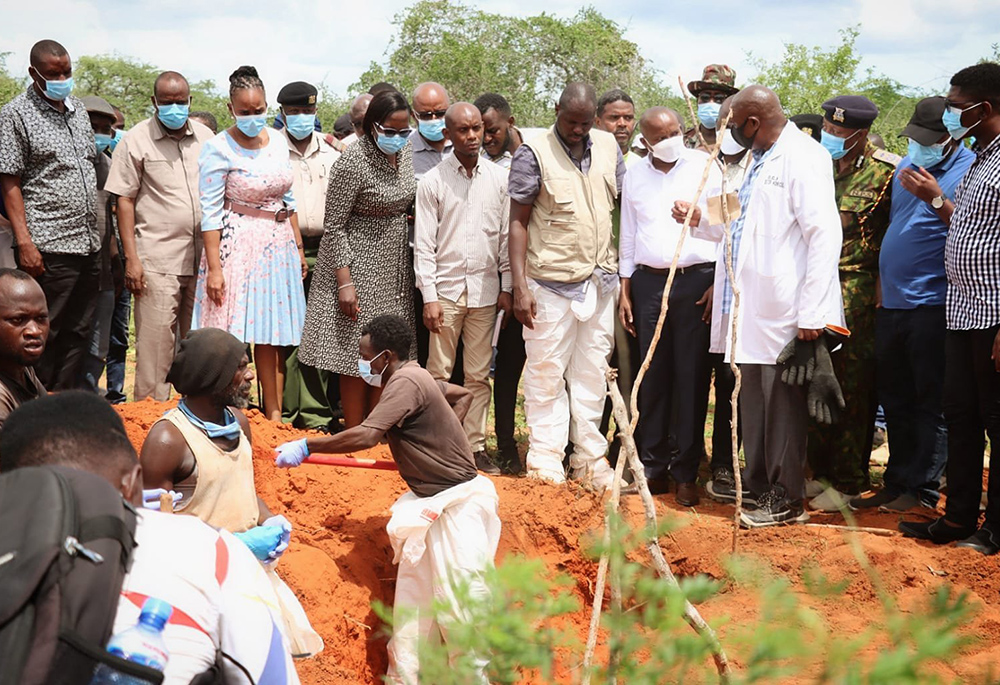
Kenyan authorities continue to retrieve bodies from shallow graves in an 800-acre ranch in Kilifi County near the town of Malindi. All victims were followers of the Good News International Church Pastor Paul Mackenzie. He allegedly told followers to pray and fast to meet Jesus and that the world would end April 15. (OSV News/Courtesy of Sheshi Visual Arts/Moses Mpuria)
Cult deaths prompt Kenyan sisters, religious leaders to call for strict scrutiny of churches
Following the deaths of more than 100 cult followers in what is now known as the "Shakahola Forest Massacre," Catholic sisters and church leaders in Kenya are pressing the government to implement tighter regulations on religious bodies and clerics.
"Whatever is happening is completely evil and madness," Sr. Bridgita Mwawasi Samba, member of the Sisters of St. Joseph of Mombasa, told GSR Africa/Middle East correspondent Doreen Ajiambo in May. "Rogue elements are taking advantage of innocent people and killing them. The government should regulate churches to prevent such deaths from happening in the future."
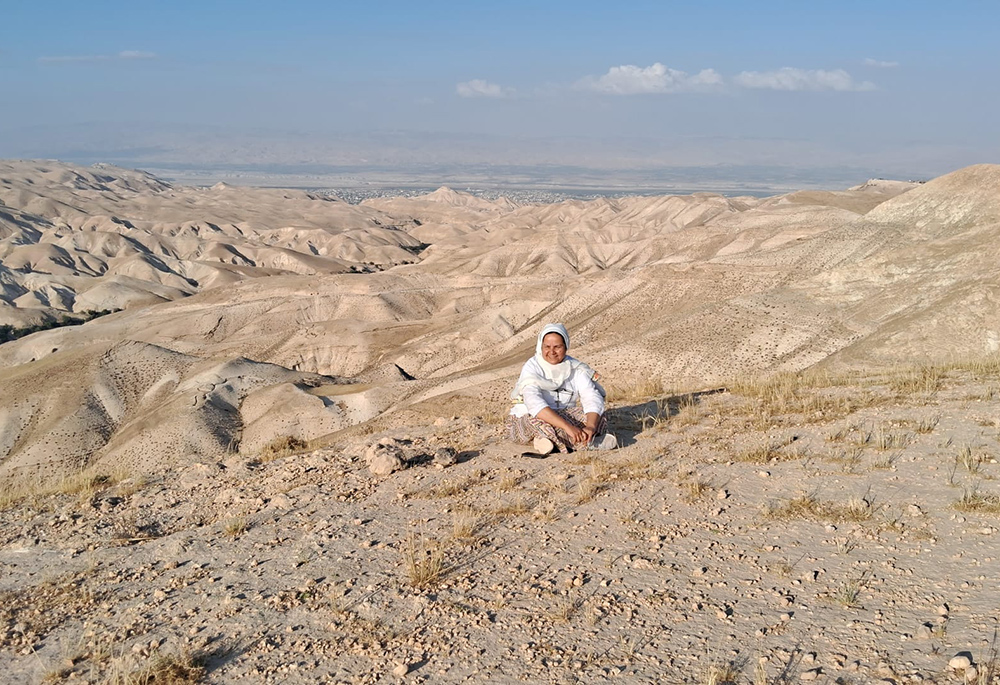
Cecilia Sierra praying in the Judean desert near Mount Musa (Courtesy of Cecilia Sierra)
'Prayer is life': Sisters share how they pray, and how that prayer evolved
In June, we asked The Life panelists to share their reflections on the following question, and their responses were deeply personal, poetic and moving: What is your favorite time/place to pray? How has your prayer "evolved" in your lifetime?
"Prayer is life. Life is prayer," wrote Sr. Judy Dohner, a Sister of the Humility of Mary from Villa Maria, Pennsylvania. "Times of quiet reflection and openness are needed. But, if we just look around, God reveals God's presence and love everywhere all the time." Check out the sisters' responses to other topics and our new panel for The Life.
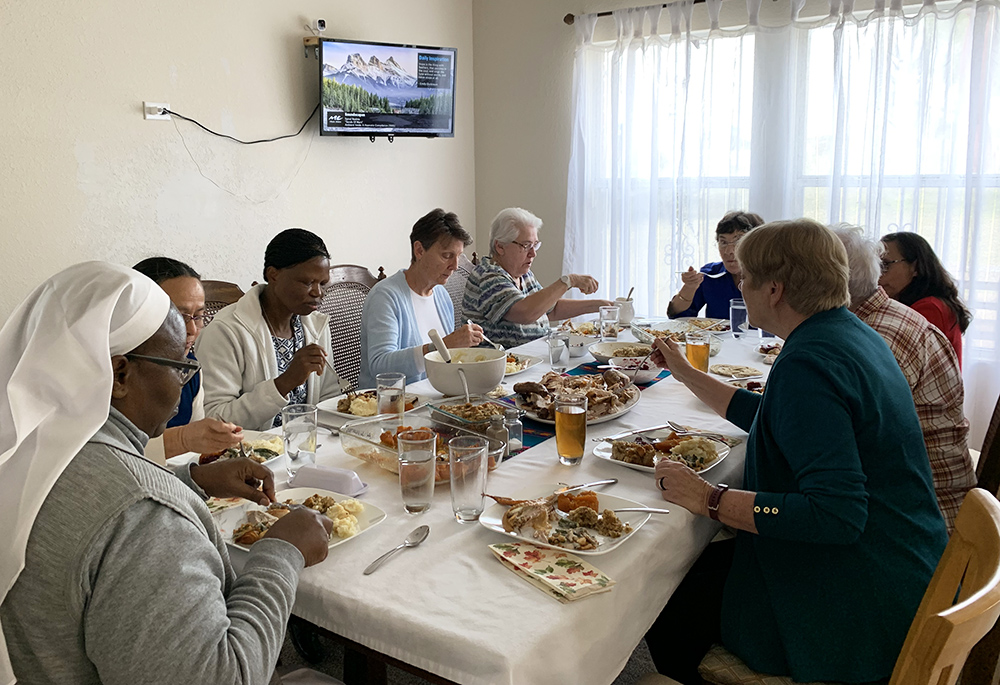
Sisters ministering to migrants in Texas' Rio Grande Valley gather with guests for Thanksgiving. Clockwise from left: SMH Sr. Beatrice Alaku; Sister of Charity of the Incarnate Word Marilu Yanes; Holy Cross Sr. Catherine Before; Immaculate Heart of Mary Sr. Mary Elaine Anderson; IHM Sr. Camille Brouillard; Mercy Sr. Theresa Saetta; Ruth Tiguila; IHM Sr. Rose Patrice Kuhn; and Mercy Sr. Patricia Mulderick. (Courtesy of IHM Sr. Elvia Mata)
After volunteering at US-Mexico border, sisters move permanently
When Mercy Srs. Patricia Mulderick and Theresa Saetta responded in early 2021 to the call for volunteers to help serve migrants and asylum-seekers at the U.S. border with Mexico, they were overwhelmed by the need they found waiting for them.
"Most of us have been in areas where we've experienced a lot of poverty," Mulderick told Stockman in March. "But to be honest, I don't think I ever saw anything like when we first went over to Reynosa."
The need was so great, in fact, that after they went back home, the thought wouldn't leave them that they needed to do more. So, by September of that year, they both moved to the McAllen, Texas, area to minister permanently.
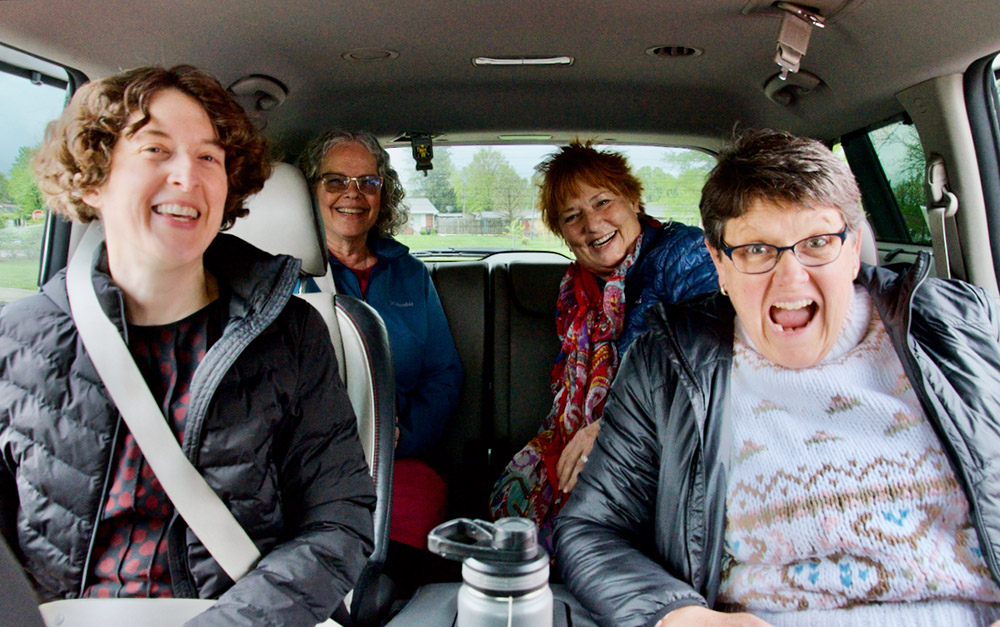
Women Touched by Grace participants, from left, the Rev. Julie Webb, the Rev. Diana Thompson, the Rev. Sarah Hollar and the Rev. Tamara Franks leave for a field trip April 28 to the Indiana Historical Society in Indianapolis. (GSR photo/Dan Stockman)
Benedictines help Protestant women clergy explore spirituality, leadership
Without Catholic nuns, the Rev. Meghan Davis-Brass might have ended her 14-year career as a Presbyterian pastor.
Benedictine sisters have helped Davis-Brass and 88 other women sustain and strengthen their ministries as Protestant clergy through a program called Women Touched by Grace, in which Benedictine nuns teach Protestant female clergy how to be better pastors through a series of retreats.
Catholic sisters reflect on Benedict's impact on church, religious life
Pope Benedict XVI died Dec. 31, 2022, taking with him a complicated legacy and relationship with U.S. Catholic sisters.
Benedict was known as a conservative and was pope at the start of the doctrinal assessment of LCWR, the Resource Center for Religious Institutes, and Network, a Catholic social justice lobby, in 2012. An apostolic visitation examining all sisters in the United States began in 2009.
But Sr. Carol Zinn, a member of the Sisters of St. Joseph of Philadelphia and LCWR executive director, said it is an oversimplification to solely blame Benedict.
"That whole situation was way more complex and way beyond any one person," Zinn said. Instead, "over the years, a feeling arose about LCWR in particular and American sisters in general, and that feeling got institutionalized."







